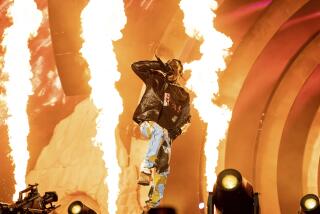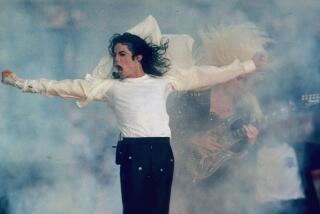Jackson used vocal aid in concerts, choreographer says
- Share via
Michael Jackson sometimes sang during concerts accompanied by his own recorded vocal track to help him perform the most physically strenuous numbers, the choreographer for what was to be his comeback shows in London testified Monday.
What is known as a vocal assist track is used by performers to boost their voices, for example, if dancing makes it difficult to sing to their standards.
Travis Payne, testifying in the wrongful death suit filed by Jackson’s mother and three children, said the singer told him that on the “This Is It” concerts, he wanted to sing all the vocals live, “which he had not done in the past on every tour…. This was a goal he set for himself.”
PHOTOS: AEG-Michael Jackson wrongful-death trial
Payne said that Jackson had never performed a complete show with just his live vocals.
He said Jackson had not reached his goal by the time he died June 25, 2009, but the choreographer thought he could have pulled it off.
Jackson’s family alleges in the suit that entertainment giant AEG hired and supervised Dr. Conrad Murray, the tour doctor who administered a fatal dose of the anesthetic propofol shortly before the series of 50 concerts was to begin. Murray is now serving jail time for involuntary manslaughter.
AEG says that it was Jackson who wanted Murray with him and that the $150,000 a month the company was supposed to pay the doctor was just part of the multimillion-dollar advance it had given to the singer.
Payne also testified that Jackson was involved in almost every detail of his scheduled shows, such as costume, wardrobe and set design, choosing the dancers and the bandleader.
The choreographer said that on most days he would rehearse with Jackson at the singer’s rented Holmby Hills mansion for several hours, but as show time approached, he missed some rehearsals with the full crews, causing “production” to worry whether he would be ready.
Payne and associate choreographer Stacy Walker said they were working to modify Jackson’s dance routine to his age. “I was realizing that’s Michael Jackson, but he’s not 20 or 30 any more,” Walker testified, “he’s 50 and how is that going to be? We have to figure it out.”
Earlier in the day, Christopher Rogers, the Los Angeles County deputy medical examiner, testified that Jackson’s weight was in the normal range for his height. Rogers said that Jackson was 5 feet, 9 inches tall and 136 pounds when he was weighed and measured at the coroner’s office the day after he died.
Rogers said he gave Jackson a body mass index of 20.1. It would take a BMI of less than 18.5 for him to be considered underweight.
Rogers’ testimony was used by AEG to try to rebut witnesses who testified that Jackson was rail thin. A paramedic testified that when he answered the 911 call to Jackson’s rented Holmby Hills mansion, the singer was so emaciated that he looked like an end-stage cancer patient who had come home to die.
However, under questioning by Jackson attorney Michael Koskoff, Rogers said that by the time the pop star was weighed, intravenous fluids had been administered to him in the ambulance and at Ronald Reagan UCLA Medical Center, which could have increased his weight.
Rogers testified that Jackson didn’t have much fat on him.
He also said that Jackson was only the second coroner’s case he had worked on in which the person had died of propofol toxicity. The other person worked in the medical field, he said.
Propofol, he said, “caused his death by sedation. “Essentially, he was so sedated his vital functions stopped.”
Rogers also said that “other doctors contributed to Jackson’s death,” but did not go into details.
ALSO:
Manhunt for triple-slaying suspect focuses on rugged landscape
Bike Week L.A.: Countywide activities for cyclists get underway
Jackson pulled it together in final rehearsals, choreographer says
More to Read
Sign up for Essential California
The most important California stories and recommendations in your inbox every morning.
You may occasionally receive promotional content from the Los Angeles Times.











